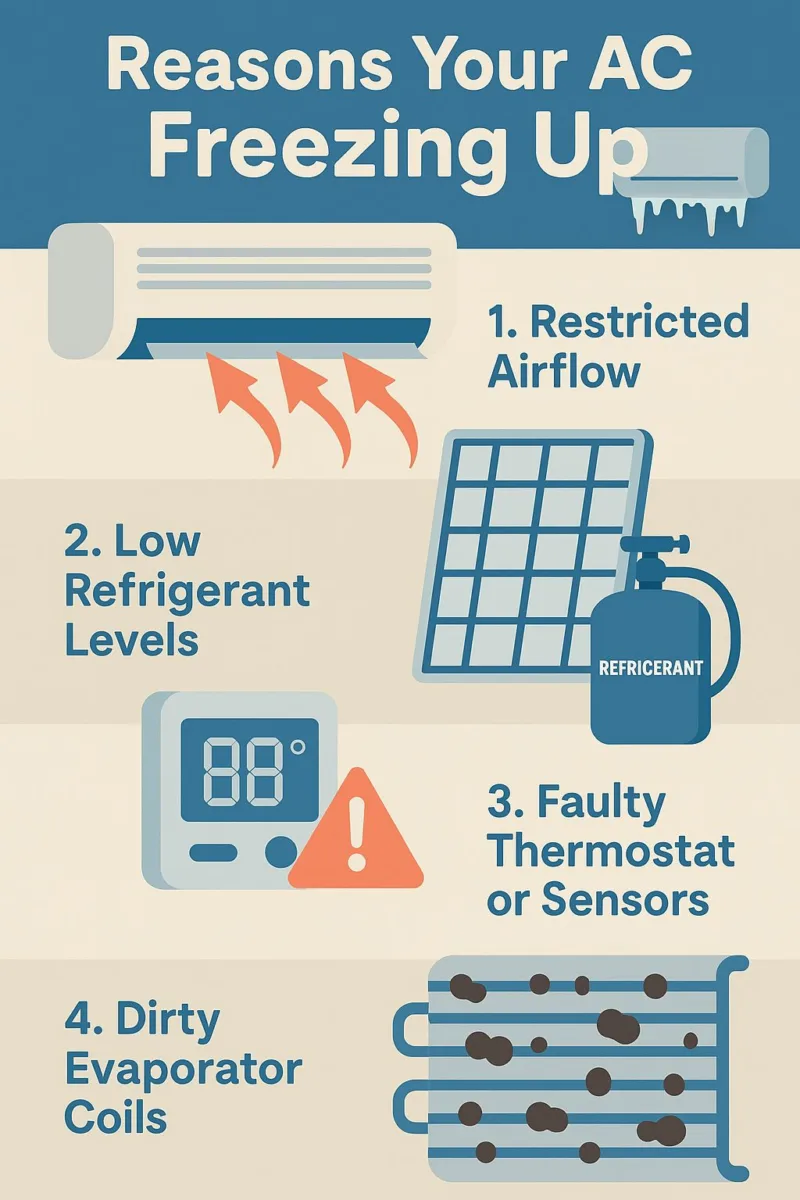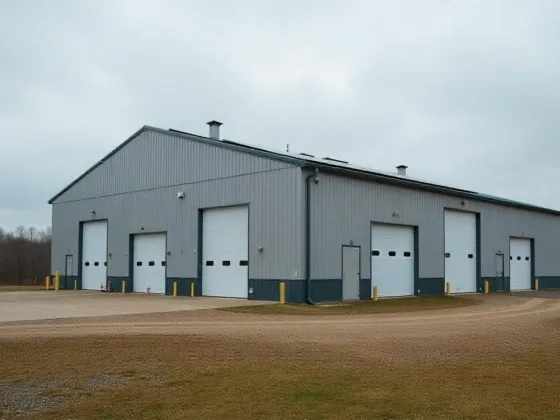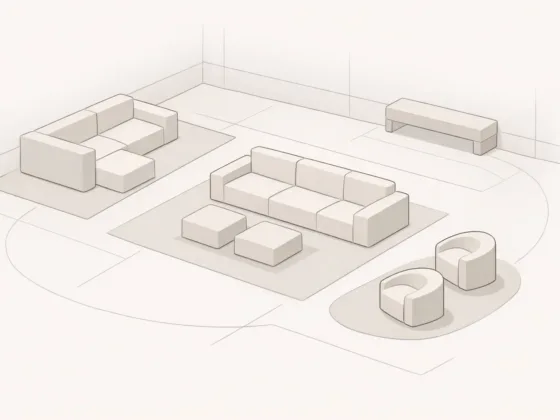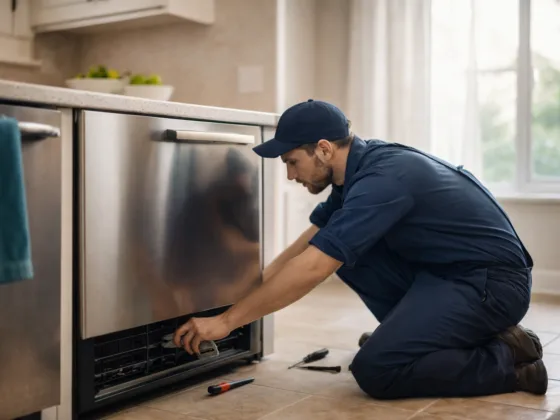Seeing ice on your air conditioner during a hot summer day might seem strange—and it definitely is. When your AC unit is freezing up, it’s not working the way it should, and ignoring it can lead to serious damage or even complete system failure.
If your air conditioner is not cooling the way it used to, that layer of ice could be a red flag. In this article, we will explore the main reasons why this happens and when you should contact an AC repair service.
Why Is My AC Freezing Up?
There are a few common reasons why your AC might be freezing up, and knowing them can help you fix the problem early:
1. Restricted Airflow
One of the most common reasons your AC might freeze is restricted airflow. Your air conditioner needs a steady stream of warm air to pass over the evaporator coil in order to work correctly.
If that airflow is blocked, whether by a dirty air filter, closed or covered vents, or a malfunctioning blower motor, the coil gets too cold and begins to freeze. When this happens, your AC can’t cool your home effectively, and if the issue isn’t fixed quickly, it can cause serious damage to the system.
Quick fix: Check and replace dirty filters, and make sure no vents are blocked by furniture or curtains.
2. Low Refrigerant Levels
Low refrigerant is a common reason your air conditioner might freeze up. When the refrigerant level drops, so does the pressure inside the system. This lower pressure causes the evaporator coil to become too cold, which leads to ice forming on the coil. In most cases, low refrigerant is caused by a leak somewhere in the system.
Since handling refrigerant requires special tools and training, this isn’t something you can fix on your own. It’s a serious issue that needs to be diagnosed and repaired by a licensed HVAC technician.
Watch for: Hissing sounds, reduced cooling power, or ice build-up even after you’ve changed the filter.
3. Faulty Thermostat or Sensors
If your thermostat isn’t reading the indoor temperature correctly, it can cause your AC to run longer than it should. This constant operation overcools the evaporator coil, leading to freezing. Sometimes the issue is as simple as incorrect settings or a weak battery, but it could also be a faulty or misaligned sensor inside the unit.
If your system runs nonstop or struggles to maintain the set temperature, it’s a good idea to check the thermostat first or have a technician take a closer look.
Quick fix: Check your thermostat settings and battery. If problems persist, call in a pro.
4. Dirty Evaporator Coils
Over time, dust and grime can coat your evaporator coils, creating a layer that blocks heat from being absorbed properly. As a result, the coil gets too cold and starts to freeze. This type of buildup often happens slowly, so you might not notice a problem until your AC performance drops.
If you see ice, weak airflow, or warm air coming from the vents, dirty coils could be to blame. Let the unit thaw, then clean the coils carefully with a soft brush or no-rinse coil cleaner. Regular filter changes and annual maintenance can help keep this from happening again.
Watch for: Ice buildup, weak airflow, or warm air from vents — all signs your coils might be dirty.
Why Ice on Your Air Conditioner Is a Big Deal
Some homeowners assume their air conditioner freezing up is just a one-time glitch, but this issue almost always points to an underlying problem. A frozen coil blocks airflow, reduces energy efficiency, and overworks your compressor—the most expensive part of your system to replace.
If ignored, what starts as minor ice buildup can lead to major expenses:
- One of the most costly outcomes is a damaged compressor, which can run homeowners anywhere from $1,500 to over $3,000 to replace.
- Even if the compressor survives, a frozen coil forces the system to work harder, which spikes energy bills and reduces efficiency.
- As the ice melts, water can leak into surrounding areas, potentially causing damage to flooring or walls.
- Over time, repeated freezing and thawing can also lead to internal leaks and other hidden damage, significantly shortening the lifespan of your system.
Addressing the issue early helps you avoid these expensive headaches.
When to Call for AC Repair
Here’s when you should skip DIY and get help from a qualified HVAC technician:
- Ice keeps coming back even after changing filters or letting the unit thaw
- You hear strange hissing or bubbling noises
- Your air conditioner is not cooling rooms evenly or struggles to reach the set temperature
- The unit stops running altogether after freezing up
Professionals have the tools to inspect your refrigerant levels, test components, and clean internal parts safely. More importantly, they don’t just melt the ice and leave—they perform a full system check to get to the root of the problem. This includes:
- Inspecting the refrigerant charge
- Checking for leaks (common culprits behind freezing)
- Evaluating the condition of both the evaporator and condenser coils
- Ensuring the coils are clean and functioning properly
- Testing the blower motor
- Looking for anything obstructing the system
- Checking the thermostat for accuracy
- Examining the ductwork for blockages that could restrict airflow
This thorough diagnostic helps ensure your system runs smoothly and prevents future issues.
Preventing Future Freezing
Preventing your AC from freezing again is often as simple as sticking to a few basic maintenance habits.
- Change your air filter regularly: Start by changing your air filter every one to two months during the cooling season to keep airflow steady.
- Keep vents clear: Make sure all supply and return vents in your home are open and unobstructed by furniture, curtains, or dust buildup.
- Schedule professional maintenance: It’s also a good idea to schedule professional AC maintenance at least once a year so a technician can catch small issues before they become major problems.
- Maintain the outdoor unit: Don’t forget the outdoor unit—clear away leaves, dirt, or other debris from the coils to help the system breathe.
- Check thermostat and sensors: Lastly, check that your thermostat and sensors are functioning properly, as inaccurate readings can lead to overcooling and coil freeze-ups.
Final Thoughts
Ice on your AC unit may seem like a minor issue, but it’s often the sign of a bigger problem—one that’s best addressed before summer hits full force. Whether it’s a frozen AC coil, airflow problem, or low refrigerant, don’t delay the fix. Timely AC repair keeps your system running efficiently, saves you money, and avoids a hot, uncomfortable home.
FAQs
Why is there ice on my air conditioner?
Ice on your air conditioner usually indicates a problem with airflow, low refrigerant levels, a faulty thermostat, or dirty evaporator coils. It’s crucial to address this issue promptly, as it can lead to more significant damage and reduced efficiency.
What causes restricted airflow in my AC?
Restricted airflow can be caused by a dirty air filter, closed or blocked vents, or a malfunctioning blower motor. These issues prevent warm air from reaching the evaporator coil, causing it to freeze.
How can I tell if my air conditioner has low refrigerant levels?
Signs of low refrigerant levels include hissing sounds, reduced cooling power, and ice build-up on the evaporator coil, even after changing the air filter. This issue should be diagnosed and repaired by a licensed HVAC technician.
What should I do if my AC keeps freezing up?
If your AC keeps freezing, you should check and replace dirty filters and ensure vents are unobstructed. If the problem persists, call a qualified HVAC technician to inspect the system for underlying issues.
How can I prevent my air conditioner from freezing in the future?
To prevent your AC from freezing, change the air filter every one to two months, ensure all vents are open and unobstructed, schedule annual professional maintenance, and keep the outdoor unit clean and clear of debris.
When should I call a professional for AC repair?
You should call a professional if ice keeps returning after changing filters, if you hear strange noises, if your AC struggles to cool evenly, or if the unit stops running altogether after freezing. A technician can perform a thorough diagnostic to identify and fix the root of the problem.











